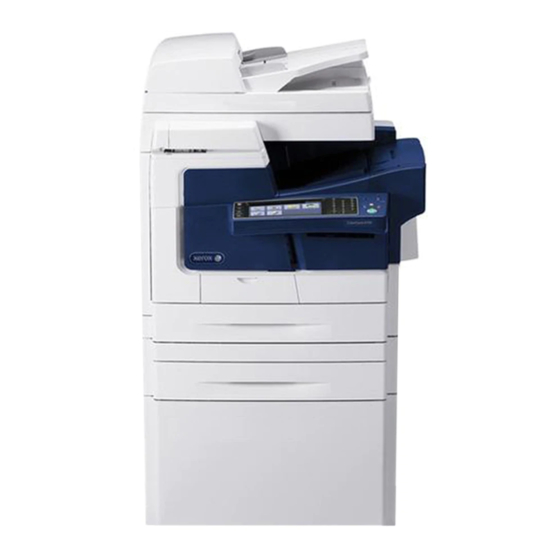User Interface Diagnostics - Allows the user to run diagnostics on the User Interface software. Is accessible by pressing the
•
machine hard buttons 'Dial Pause' + '*' + '#' in that order.
16. The Web UI provides a set of on-line help pages that provide guidance on most of the Web UI pages. These on-line help pages
can be accessed from the Web UI by selecting the [Help] button on the upper right hand corner of every Web UI page; the on-
line help page corresponding to the Web UI page being viewed will be displayed. There is also a 'TOC' contents list of all Web UI
help pages to the left of each help page; scrolling through the content list and selecting the desired page will also cause the
applicable on-line help page to be displayed.
The following pages are available from the Web UI with System Administrator login and authentication but are not
documented in the SAG, User's Guides or the on-line help:
LDAP Policy - Allows the System Administrator to set the use of Simple Authentication and Security Layer (SASL) to
•
authenticate and encrypt LDAP. Is accessible by selecting the Properties tab and then selecting the following entries from
the Properties 'Content menu': { Either Connectivity
hyperlink under 'Actions' from the LDAP Servers line }
Application Domain/Content Query - Allows the configuration of the system to perform an LDAP query for the logged-in
•
user's
authentication
11
Address}
/diagnostics/index.dhtml and then selecting 'Authentication Domain/Context Query' from the Diagnostics
Content Menu.
•
Scanning Lock Files - Allows bypassing the filename locking feature. Is accessible by typing http://{IP
Address}/diagnostics/index.dhtml and then selecting 'Scanning Lock Files' from the Diagnostics Content Menu or by
typing http://{IP Address}/diagnostics/lockFiles.dhtml.
Gray Other Queues Button - Allows the System Administrator to grey out the 'Other Queue' button on the Local UI. Is
•
accessible by typing http://{IP Address}/diagnostics/index.dhtml and then selecting 'Grey Other Queues Button' from the
Diagnostics Content Menu or by typing http://{IP Address}/diagnostics/hideotherqueuesbutton.php.
Secure Print Alphanumeric PIN - Allows the System Administrator to set the secure print PIN to be alphanumeric
•
characters instead of just digits. Is accessible by typing either http://{IP Address}/diagnostics/index.dhtml and then
selecting 'Secure Print Alphanumeric PIN' from the Diagnostics Content Menu or by typing http://{IP
Address}/diagnostics/secureprintalphanumericpin.php.
•
Secure Attribute Editor - Allows the user to change some system attributes related to PDLs (e.g., memory usage, copies per
page, etc.). Is accessible by typing http://{IP Address}/diagnostics/secureattr.dhtml.
•
Suppress Job Name - Allows the System Administrator to suppress displaying the job name on the Banner Page when
submitting a print job. Is accessible by typing http://{IP Address}/diagnostics/jobNameSuppress.dhtml.
•
Job Log File Format - Allows the System Administrator to set the XML job log file format. Is accessible by typing http://{IP
Address}/diagnostics/jobLog.dhtml.
•
File Extension Case - Allows the System Administrator to select all file extensions to be created in either lower or upper
case. Is accessible by typing http://{IP Address}/diagnostics/fileExtensionCase.dhtml.
•
Email Security - Allows the System Administrator to secure the device's email service. Is accessible by typing http://{IP
Address}/diagnostics/emailSecurity.php.
•
Binary Printing Support - Allows the device to accept printing jobs that are identified as binary files. Is accessible by typing
http://{IP Address}/diagnostics/binaryAllow.php.
•
XSA Reports with User IDs - Allows the device to generate Xerox Standard Accounting reports with User IDs. Is accessible
by typing http://{IP Address}/diagnostics/enableUserID.php.
•
Postscript Filter PDL Guessing Policy - Allows the System Administrator to select whether the Postscript Filter guess
algorithm will use a strict or loose interpretation. Is accessible by typing http://{IP
Address}/diagnostics/postScriptTokens.php.
Web Services IP Lockout Reset - Allows the System Administrator to clear the Web Services IP Address Lockout cache. Is
•
accessible by typing http://{IP Address}/diagnostics/ipLockout.php.
Service Registry Reset - Allows the System Administrator to reset the device's Service Registry to its default values. Is
•
accessible by typing http://{IP Address}/diagnostics/registryReset.php.
11
{IP Address} is the IPv4 address of the machine
domain
prior
to
authenticating
Protocols
LDAP or Security
[LDAP Policies].
the
server.
Authentication
Is
accessible
by
typing
Setup
Edit
http://{IP
8

